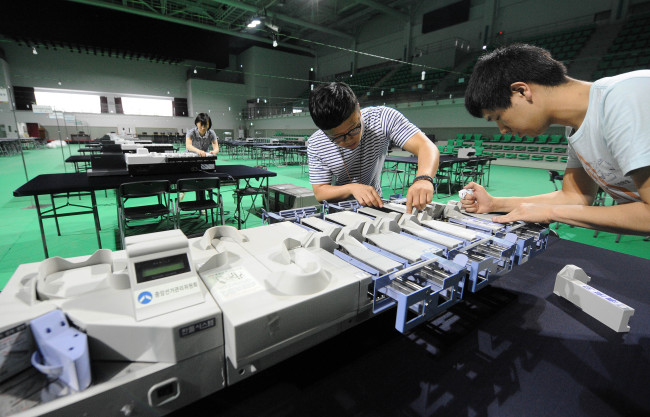Despite the high participation rate of early voting, rival parties on Monday expressed concerns that the rate could have the opposite effect among supporters in the June 4 local elections.
The ruling Saenuri Party expressed fears of a higher-than-expected voting rate among voters in their 20s, while the main opposition New Politics Alliance for Democracy worried that the surprisingly high proportion of young voters would, in turn, stimulate more of the elderly to vote on Wednesday.
The ruling Saenuri Party expressed fears of a higher-than-expected voting rate among voters in their 20s, while the main opposition New Politics Alliance for Democracy worried that the surprisingly high proportion of young voters would, in turn, stimulate more of the elderly to vote on Wednesday.

According to the state-run election watchdog the National Election Commission, the voter participation in the May 30-31 early voting came in at 11.49 percent, surpassing projections and raising expectations for the overall voting rate on Wednesday. Some expressed hope that the entire voter participation rate will go beyond 60 percent. The current voting system was introduced to increase voter turnout.
The voter rate was highest among people in their 20s at 15.97 percent while voters in their 30s showed the lowest participation with 9.41 percent. By age, voters in their 20s and 30s had a turnout of 25.4 percent, similar to those in their 50s and 60s with 23.8 percent.
The high voting rate among people in their 20s is widely believed to give the advantage to the main opposition party. Saenuri spokesman Park Dae-chul said the party is on the verge of a crisis, expressing fears about how young voters will impact the election results.
But the NPAD also expressed deep concern, saying the high rate among young voters was probably because thousands of soldiers and police officers cast their ballots over the weekend. The NEC said about 320,000 men serving in the military and the police force participated in early voting.
“The reason why the rate among voters in their 20s was high is because it included absentee votes by the military,” said NPAD spokesman Park Gwang-on. “We are deeply concerned because the voting rate among people in their 30s and 40s was lower than those in their 50s and 60s,” he added.
Some political commentators also raised questions over the early voting system, saying it led voters to make decisions without taking ongoing political disputes into account. Candidates from rival parties have been attacking each other over a series of controversial issues. Seoul education chief candidates Koh Seung-duk and his rival Moon Yong-rin, for instance, have been staging a war of words after Koh’s daughter publicly spoke out against her father’s candidacy.
His daughter, Candy Koh, resides in the U.S. and said her father is not qualified to be Seoul’s education chief as he never participated in raising her and her brother. Koh defended himself by saying that his daughter was being politically used by his rival and the POSCO founder family, of which his ex-wife is a member.
By Cho Chung-un (christory@heralcorp.com)
-
Articles by Korea Herald


![[Herald Interview] 'Amid aging population, Korea to invite more young professionals from overseas'](http://res.heraldm.com/phpwas/restmb_idxmake.php?idx=644&simg=/content/image/2024/04/24/20240424050844_0.jpg&u=20240424200058)














![[KH Explains] Korean shipbuilding stocks rally: Real growth or bubble?](http://res.heraldm.com/phpwas/restmb_idxmake.php?idx=652&simg=/content/image/2024/04/25/20240425050656_0.jpg&u=)

